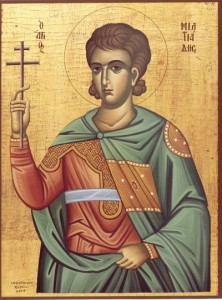We live in tumultuous times. The constant threat of terrorism, fear of the spread of nuclear weapons, worldwide economic instability, and frequent natural disasters often keep us on edge and prevent us from feeling the peace and security we all desire.
But there have been worse times for many. St. Melchiades (or Miltiades) lived in another tumultuous time, from the late third to the early fourth centuries. The details of his birth and youth are unknown, but it is certain that Melchiades was of African heritage. He was living in Rome during the violent persecution of Christians in the time of the Emperor Diocletian. He suffered through – and managed to survive – the times when Christians were forced to pay worship to the Emperor and to turn over copies of the Holy Scriptures and other objects used in Christian worship. Christians were deprived of voting privileges, they had no recourse to the law courts and they were not allowed to hold office. Buildings used as churches were confiscated or burned. For those who resisted any of this or refused to follow the orders of the emperors, torture and death (by burning or crucifixion) awaited.
Sometimes, the lives of Christian leaders were spared but they were removed from their flocks. Bishop Eusebius of Rome was sent into exile in 309 but soon died, and Rome was without a bishop until the election of Melchiades in 311. In the following year, the military leader Constantine defeated Maxentius, gaining control of Rome, and things began to look up for the Christian community. Constantine, along with Galerius and Licinius who shared imperial power, issued an edict allowing for religious toleration. As a result, Christians were once again allowed to worship freely and to restore their church buildings. (Unfortunately during this time, Maximinus Daia, who ruled in the East, did not extend toleration to Christians so persecutions continued there.)
In October of 312, the fate of Christians throughout the world became even more secure, when Constantine won the battle of the Milvian Bridge after his dramatic vision of victory through the Cross of our Lord Jesus Christ. Christianity soon became the favored religion of the empire. Constantine even donated the Lateran Palace to the Christian community for use as a center for the administration of church affairs. Bishop Melchiades could rejoice in the freedom and protection which the Church now enjoyed.
But the devil wasted no time in stepping in to disrupt this freedom. Controversy arose – primarily in Africa – over the validity of the sacraments by those bishops and priests who had weakened during the persecutions. The African bishops considered those who had relinquished the Scriptures or made other concessions in order to remain alive as traitors. They said that Bishop Caecilian of Carthage had been consecrated by such traitors and should, therefore, be removed from office and they appealed to Emperor Constantine to settle their dispute. He wisely referred it back to the bishops, asking Pope Melchiades to preside at a council for judgement on the issue. With several bishops from Gaul (where there had been fewer persecutions so those bishops were thought to be more objective) and others from Italy, the council decreed that Caecilian was a legitimate bishop and should remain in office. This resulted in a schism by those who followed the leading dissident, Donatus. The Donatists set up a rival sect and even wrongly accused Pope Melchiades of having been a traitor during the persecutions.
After a pontificate of only three years, Pope Melchiades fell asleep in the Lord in January of 314. His relics were buried in the catacombs of Callistus and he was immediately declared a saint by the people. His life had been full of tumult, but he had bravely served our Lord in his Church and could be assured of hearing His words, “Well done, thou good and faithful servant.” Holy Melchiades, pray for us.
